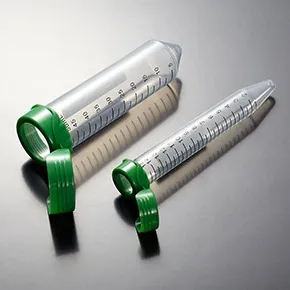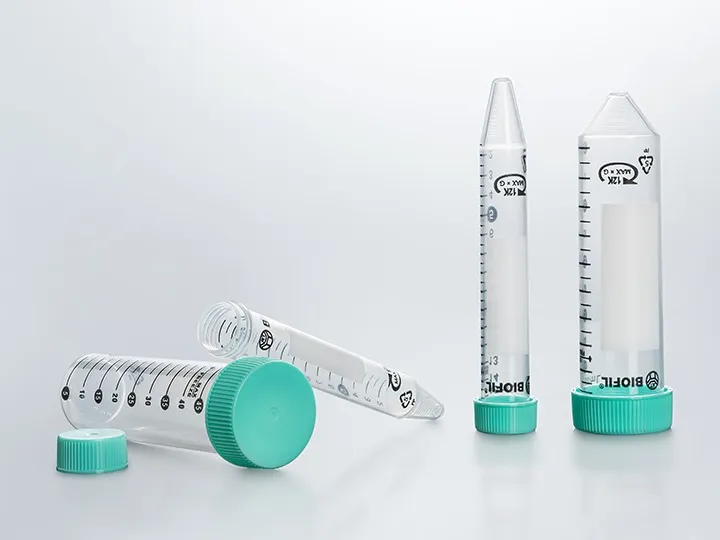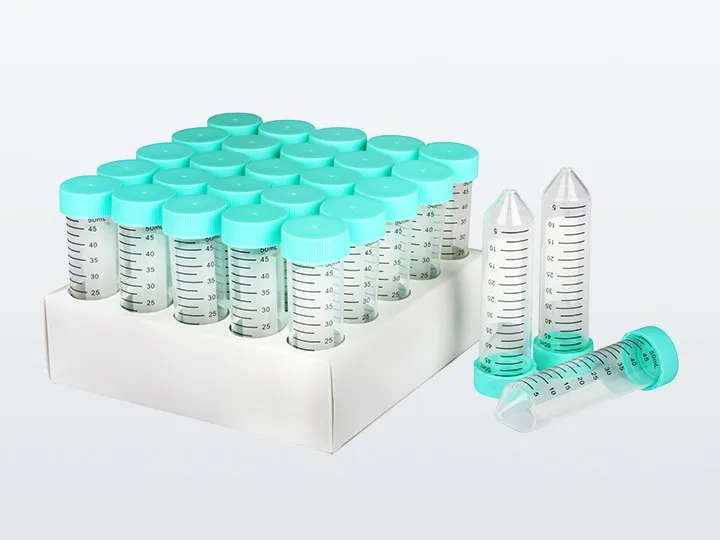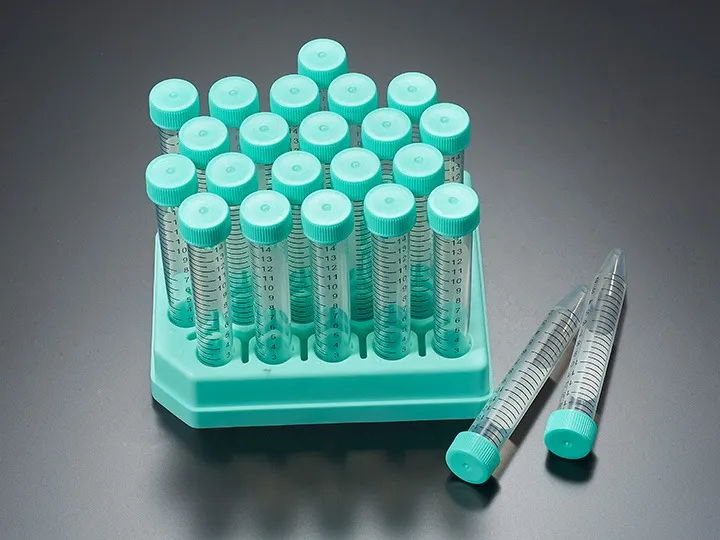What are conical centrifuge tubes and why do laboratories worldwide rely on them for sample separation? Conical centrifuge tubes are specialized laboratory containers with a cone-shaped bottom designed to efficiently separate and collect samples during centrifugation. These tubes enable complete sample recovery and provide superior clarity for result analysis.

Quick Reference: Conical Centrifuge Tubes Key Facts
| Feature | Details |
|---|---|
| Market Size (2025) | $869.8 million, growing to $1,557.8 million by 2035 |
| Growth Rate | 6.0% CAGR |
| Common Volumes | 15mL, 50mL, 225mL |
| Material | Polypropylene (PP) or Polystyrene (PS) |
| Temperature Range | -80°C to +121°C |
| Max RCF Rating | 16,000 RCF for 50mL tubes |
| Primary Uses | Cell culture, DNA/RNA extraction, protein purification |
| Key Advantage | Complete sample recovery due to conical bottom |
Table of Contents

What Makes Conical Centrifuge Tubes Essential for Modern Laboratories?
Conical centrifuge tubes feature a unique cone-shaped bottom that allows complete sample recovery, unlike round-bottom tubes that can trap valuable specimens. This design significantly improves laboratory efficiency and reduces sample waste during critical research procedures.
The laboratory industry continues to grow rapidly. Furthermore, these tubes are commonly used in molecular biology, cell culture, and clinical diagnostics for secure, efficient sample separation and analysis. Additionally, their versatile design makes them indispensable for various scientific applications.
Moreover, the global market reflects this importance. North America holds the largest market share, accounting for approximately 35% of the global centrifuge tubes market. This dominance stems from advanced healthcare infrastructure and robust research activities.
How Do Conical Centrifuge Tubes Work in Laboratory Applications?
Conical centrifuge tubes work by utilizing centrifugal force to separate samples based on density differences. The conical bottom design concentrates pellets at the tip, making sample collection easier and more efficient than traditional round-bottom tubes.
During centrifugation, heavier particles migrate toward the bottom due to gravitational force. Consequently, the conical shape ensures all particles collect at the single point of the tube’s tip. This design eliminates the frustration of incomplete sample recovery.
Furthermore, conical tubes are useful when separating a solid or semi-solid material from a liquid. Scientists particularly value this feature when working with precious or limited samples. Therefore, laboratories worldwide prefer conical designs for critical applications.
What Are the Key Types and Sizes of Conical Centrifuge Tubes?
The most common conical centrifuge tube sizes include 15mL and 50mL volumes, with specialized options ranging from 5mL to 225mL. Each size serves specific laboratory needs, from small-scale molecular work to large-volume sample processing applications.
15mL Conical Tubes
These smaller tubes work perfectly for routine laboratory tasks. Additionally, 15 ml tubes are graduated in 0.5 ml subdivisions from 2 to 15 ml. They offer precise measurement capabilities for accurate sample handling.
50mL Conical Tubes
The industry standard for most applications, 50mL tubes provide versatility. Moreover, 50 ml tubes are graduated in 2.5 ml subdivisions from 5 to 50 ml. These tubes handle larger sample volumes effectively.
Specialty Sizes
Laboratories also use 5mL, 225mL, and other custom sizes. Each variant serves specific research requirements and sample volume needs.
Which Materials and Features Should You Consider for Conical Centrifuge Tubes?
High-quality conical centrifuge tubes are typically manufactured from virgin polypropylene (PP) or polystyrene (PS), offering excellent chemical resistance, clarity, and temperature tolerance. Premium tubes feature leak-proof caps, precise graduations, and contamination-free construction.
Material Properties
- Polypropylene (PP): Offers superior chemical resistance and flexibility
- Polystyrene (PS): Provides excellent optical clarity for microscopy
- Temperature Range: Withstands temperature extremes of -80°C to +121°C
Critical Features
Premium conical tubes include several important characteristics:
- Leak-Proof Caps: Unique double threaded cap design reducing cross threading and leakage
- Clear Graduations: Easy-to-read measurement markings
- Sterile Options: Sterile tubes are irradiated by ionizing beta radiation
- Writing Area: Large white marking spaces for sample identification
What Are the Primary Applications of Conical Centrifuge Tubes in Research?
Conical centrifuge tubes serve essential roles in cell culture, molecular biology, clinical diagnostics, and protein research. Their versatile design makes them indispensable for DNA/RNA extraction, cell pelleting, and sample concentration across various scientific disciplines.
Cell Culture Applications
Scientists frequently use conical tubes for cell harvesting and washing procedures. The conical bottom allows complete cell recovery without loss. Additionally, Falcon 50mL Conical Centrifuge Tubes are ideal for cell centrifugation; pelleting; separation by density gradients.
Molecular Biology
These tubes excel in DNA and RNA extraction protocols. Researchers appreciate the complete sample recovery for valuable genetic material. Furthermore, the clear construction allows visual monitoring of separation layers.
Clinical Diagnostics
Medical laboratories rely on conical tubes for blood component separation and urine analysis. The precise graduations ensure accurate measurements for diagnostic procedures.
Protein Research
Protein purification protocols benefit from the conical design. Scientists can efficiently collect protein pellets and remove supernatants without sample loss.

How to Select the Right Conical Centrifuge Tubes for Your Laboratory?
Choose conical centrifuge tubes based on sample volume, centrifugation speed requirements, temperature needs, and sterility requirements. Consider factors like RCF rating, material compatibility, and cap sealing performance for optimal laboratory results.
Volume Considerations
Match tube size to your typical sample volumes:
- 5-15mL: Small-scale molecular work
- 50mL: General laboratory applications
- 225mL: Large-volume sample processing
Speed and Force Requirements
Different applications require varying centrifugal forces. High-quality tubes like tested to withstand centrifugation of 16,000 RCF in a fully supported rotor ensure safe operation at maximum speeds.
Sterility Needs
Consider whether your application requires sterile tubes. Many suppliers offer gamma-irradiated options for contamination-sensitive work.
What Quality Standards and Certifications Matter for Conical Centrifuge Tubes?
Premium conical centrifuge tubes meet bioanalytical-grade requirements and undergo rigorous quality testing. Look for tubes that comply with ISO standards, FDA regulations, and offer consistent physical properties for reliable laboratory results.
Quality manufacturers ensure their products meet strict standards. For instance, Meet bioanalytical-grade requirements and provide unsurpassed performance in critical research applications. These standards guarantee reliable performance in demanding applications.
Key Quality Indicators
- Material Purity: Virgin resin construction prevents contamination
- Dimensional Consistency: Precise manufacturing ensures proper centrifuge fit
- Leak Testing: Every batch undergoes pressure testing
- Sterility Validation: Gamma irradiation or autoclave compatibility
What Are the Best Practices for Using Conical Centrifuge Tubes Safely?
Always balance conical centrifuge tubes properly, avoid overfilling, and use appropriate rotor speeds for your tube specifications. Inspect tubes for cracks before use, and never exceed manufacturer-recommended RCF limits to prevent tube failure.
Safety Guidelines
- Proper Balancing: Always balance tubes within 0.1g of each other
- Fill Limits: Never exceed 80% of tube capacity
- Speed Limits: Respect maximum RCF ratings
- Temperature Awareness: Consider thermal expansion during high-speed runs
Handling Best Practices
- Inspect tubes for damage before each use
- Use proper cap tightening technique
- Label tubes clearly with permanent markers
- Store tubes in clean, dry conditions
How Do Conical Centrifuge Tubes Compare to Other Laboratory Tube Types?
Conical centrifuge tubes offer superior sample recovery compared to round-bottom tubes, while microcentrifuge tubes serve better for very small volumes. The choice depends on sample volume, recovery requirements, and specific application needs.
Conical vs. Round-Bottom Tubes
| Feature | Conical | Round-Bottom |
|---|---|---|
| Sample Recovery | Complete (>99%) | Partial (~85-90%) |
| Pellet Concentration | Excellent | Good |
| Visual Clarity | Superior | Standard |
| Cost | Moderate | Lower |
Application-Specific Comparisons
- Cell Culture: Conical tubes excel for complete cell recovery
- Protein Work: Conical design improves pellet handling
- Storage: Both types offer similar long-term storage capabilities
What Innovations and Trends Are Shaping the Conical Centrifuge Tube Market?
The conical centrifuge tube market is evolving with smart labeling systems, improved materials, and sustainable manufacturing practices. New developments include RFID tracking, enhanced chemical resistance, and recyclable tube options for environmentally conscious laboratories.
Technology Trends
Modern laboratories increasingly demand advanced features:
- Smart Labeling: QR codes and RFID tags for sample tracking
- Enhanced Materials: Improved chemical resistance and clarity
- Automation Compatibility: Tubes designed for robotic handling
Market Growth Factors
The market continues expanding due to several key drivers:
- Increased research funding for biotechnology
- Growing clinical diagnostic needs
- Rising demand for personalized medicine
- Expansion of pharmaceutical research
Where to Buy High-Quality Conical Centrifuge Tubes?
Purchase conical centrifuge tubes from reputable laboratory suppliers who offer certified products, bulk pricing, and technical support. Consider factors like delivery speed, quality certifications, and customer service when selecting your supplier.
Supplier Selection Criteria
Choose suppliers based on these important factors:
- Quality Certifications: ISO compliance and FDA approval
- Product Range: Various sizes and materials available
- Technical Support: Expert assistance for application questions
- Delivery Reliability: Consistent stock and fast shipping
Cost Considerations
- Bulk Pricing: Significant savings for larger quantities
- Quality vs. Price: Balance cost with performance requirements
- Long-term Partnerships: Build relationships with reliable suppliers

Frequently Asked Questions About Conical Centrifuge Tubes
Can I reuse conical centrifuge tubes?
While possible, reusing conical centrifuge tubes isn’t recommended for critical applications due to potential contamination risks and reduced structural integrity. Single-use tubes ensure optimal performance and prevent cross-contamination between samples.
What’s the difference between sterile and non-sterile conical tubes?
Sterile conical tubes undergo gamma irradiation or other sterilization processes to eliminate microorganisms, making them essential for cell culture and microbiology work. Non-sterile tubes cost less and work fine for basic analytical applications.
How do I prevent conical centrifuge tubes from cracking during high-speed centrifugation?
Prevent tube cracking by using tubes rated for your centrifuge speed, avoiding temperature extremes, balancing loads properly, and inspecting tubes for stress marks before use. Never exceed manufacturer-specified RCF limits.
Can conical centrifuge tubes withstand autoclaving?
Most polypropylene conical tubes can withstand standard autoclave conditions (121°C, 15 psi), but polystyrene tubes cannot. Always check manufacturer specifications and consider using pre-sterilized tubes for convenience.
What sizes of conical centrifuge tubes are most commonly used?
The 15mL and 50mL sizes represent the most commonly used conical centrifuge tubes in laboratories worldwide. These sizes offer optimal versatility for most research applications and sample volumes.
Conclusion: Choosing the Right Conical Centrifuge Tubes for Laboratory Success
Conical centrifuge tubes remain essential tools for modern laboratory operations. Their unique design provides complete sample recovery, making them indispensable for research and clinical applications. As the market continues growing at 6.0% CAGR, innovations in materials and design will further enhance their capabilities.
When selecting conical centrifuge tubes, consider your specific application needs, volume requirements, and quality standards. Partner with reputable suppliers who understand laboratory demands and can provide technical support. With proper selection and handling, these versatile tools will support your laboratory’s success for years to come.
Whether you’re conducting cell culture experiments, performing molecular biology protocols, or processing clinical samples, the right conical centrifuge tubes make all the difference. Invest in quality products that meet your laboratory’s exacting standards and help achieve reliable, reproducible results.
For high-quality conical centrifuge tubes and comprehensive laboratory solutions, visit OBO Biology Tech – your trusted partner in scientific excellence.
Ask for free sample today
🔐 Privacy respected. No spam. Ever.
